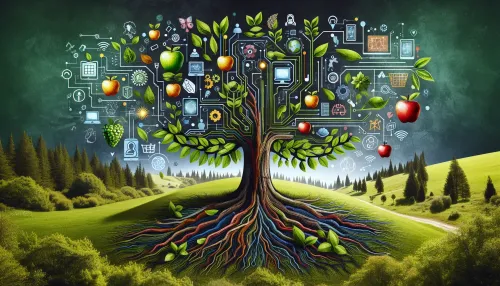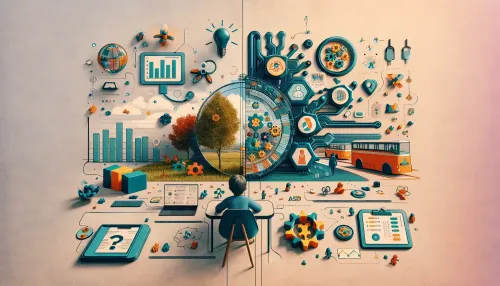Empowering Through Technology: Success Stories in Autism Education

Technology has significantly reshaped the landscape of education, especially in the realm of autism education. "HorizonsMind" explores the pioneering use of interactive technology to create more inclusive and effective learning environments for autistic children.
In the quest for inclusive education, interactive technology has emerged as a powerful ally. From interactive whiteboards to educational apps, schools are leveraging technological tools to accommodate diverse learning styles among autistic children. These innovations create a dynamic and responsive learning environment that caters to individual needs, fostering engagement and academic achievement.
Revolutionizing Learning Spaces with Interactive Technology
Artificial Intelligence (AI) is driving a seismic shift in autism education by enabling personalized learning plans. AI algorithms analyze vast datasets to identify individual learning patterns, strengths, and areas needing support. This data-driven approach allows educators to tailor instructional content, pace, and methodology, empowering autistic children to learn at their own speed and style.
Personalized Learning Plans Through AI Insights
Virtual Reality (VR) is proving to be a game-changing tool in improving social skills among autistic children. By creating immersive, simulated environments, VR facilitates real-life social interactions within a controlled setting. This paves the way for enhanced communication and interpersonal skills development, leading to more confident and socially adept individuals.
Tablet devices have revolutionized speech and communication therapy for autistic children. With specially designed apps and programs, tablets offer interactive platforms for language development, fostering effective communication skills. The intuitive interface and visual aids provided by tablets engage and motivate children, leading to significant breakthroughs in verbal expression and comprehension.
The Role of Virtual Reality in Social Skills Development
Integrating robotics into therapy sessions has transcended novelty to become a valuable tool for promoting social interaction among autistic children. Through interactive robots, children navigate social scenarios and develop pragmatic language skills in a non-threatening environment. These robots serve as engaging companions, fostering trust and communication while nurturing essential social competencies.
Enhancing Communication with Tablet Technology
Gamification has emerged as a pivotal strategy for engaging autistic learners in educational activities. By infusing game elements into learning modules, educators enhance motivation, sustain attention, and encourage skill development in a fun and interactive manner. Gamification fosters a positive learning experience while imparting essential knowledge and abilities.
Related Article: Virtual Reality and Autism: Transformative Tools for Enhanced Therapeutic Interventions
Using Robotics to Foster Social Interaction
Measuring the impact of tech-integrated programs is crucial for assessing their efficacy and refining educational approaches. Robust success metrics encompass academic progress, social skill development, communication milestones, and overall well-being. Through comprehensive data analysis, educators gain insights into the effectiveness of technology-driven interventions within autism education.
Effective collaboration between parents and teachers is pivotal in maximizing the benefits of technology-assisted education for autistic children. Dedicated apps facilitate seamless communication, progress tracking, and resource sharing between home and school environments. This collaborative approach ensures consistent support, alignment of educational goals, and holistic development for the child.
The Impact of Gamification on Engagement in Learning
By harnessing the transformative power of technology, educators and caregivers are enriching the educational journey of autistic children. The success stories emerging from these innovative approaches underscore the remarkable strides being made toward empowering every child with the tools they need to thrive in an inclusive educational ecosystem.
Frequently Asked Questions
Technology, particularly tablet devices and specialized apps, enhances communication for autistic children by providing interactive platforms for language development. These tools engage children with visual aids and intuitive interfaces, fostering effective communication skills and encouraging verbal expression in a supportive environment.
Gamification plays a significant role in autism education by incorporating game elements into learning activities. This approach boosts motivation, maintains attention, and encourages skill development in an enjoyable way. By making learning fun and interactive, gamification helps autistic learners engage more effectively with educational content.
Parent-teacher collaboration is crucial in autism education as it maximizes the benefits of technology-assisted learning. Utilizing dedicated apps for communication and progress tracking ensures consistent support between home and school. This partnership aligns educational goals and fosters holistic development for autistic children, enhancing their overall learning experience.
Check Out These Related Articles

Robotic Innovations Transcending Autism Support: Redefining Social Interaction and Skill Development

Community Technology Center: Pioneering Accessible Learning for Autistic Children

Tech-Driven Innovations in Autism Assessment and Early Intervention: Adapting to Digital Frontiers
